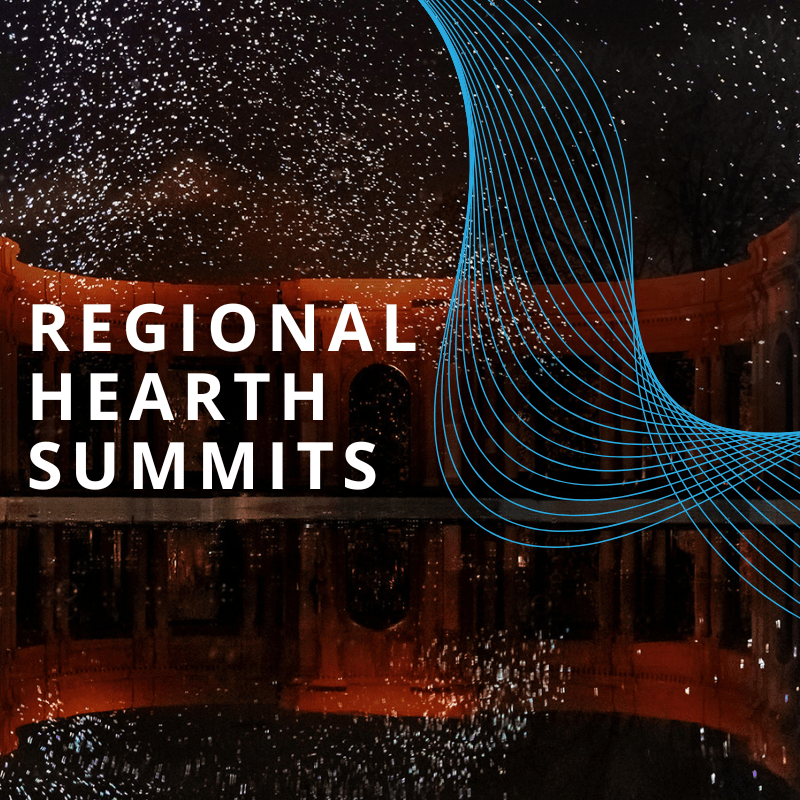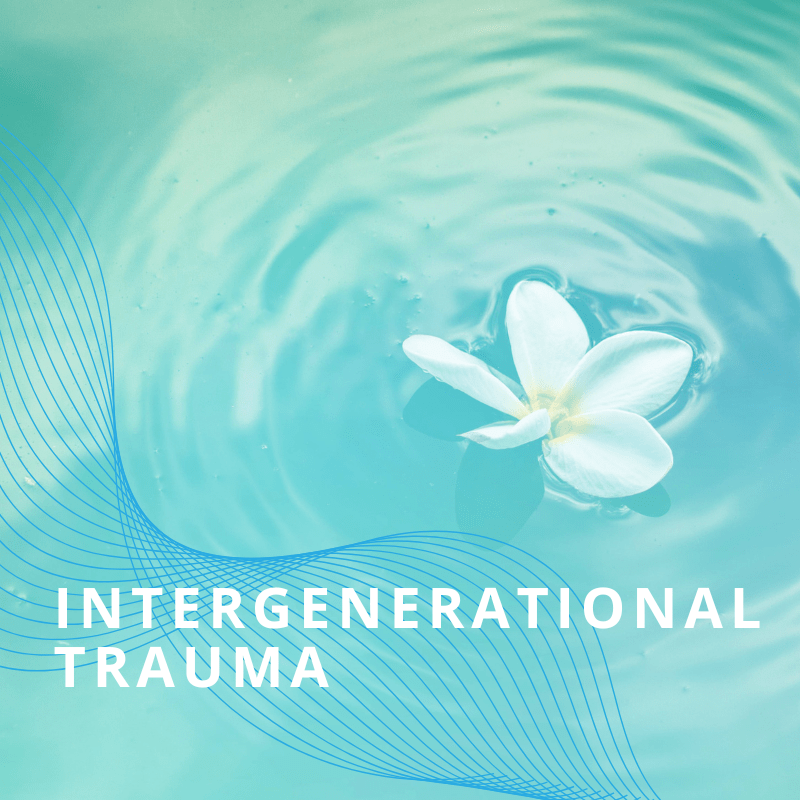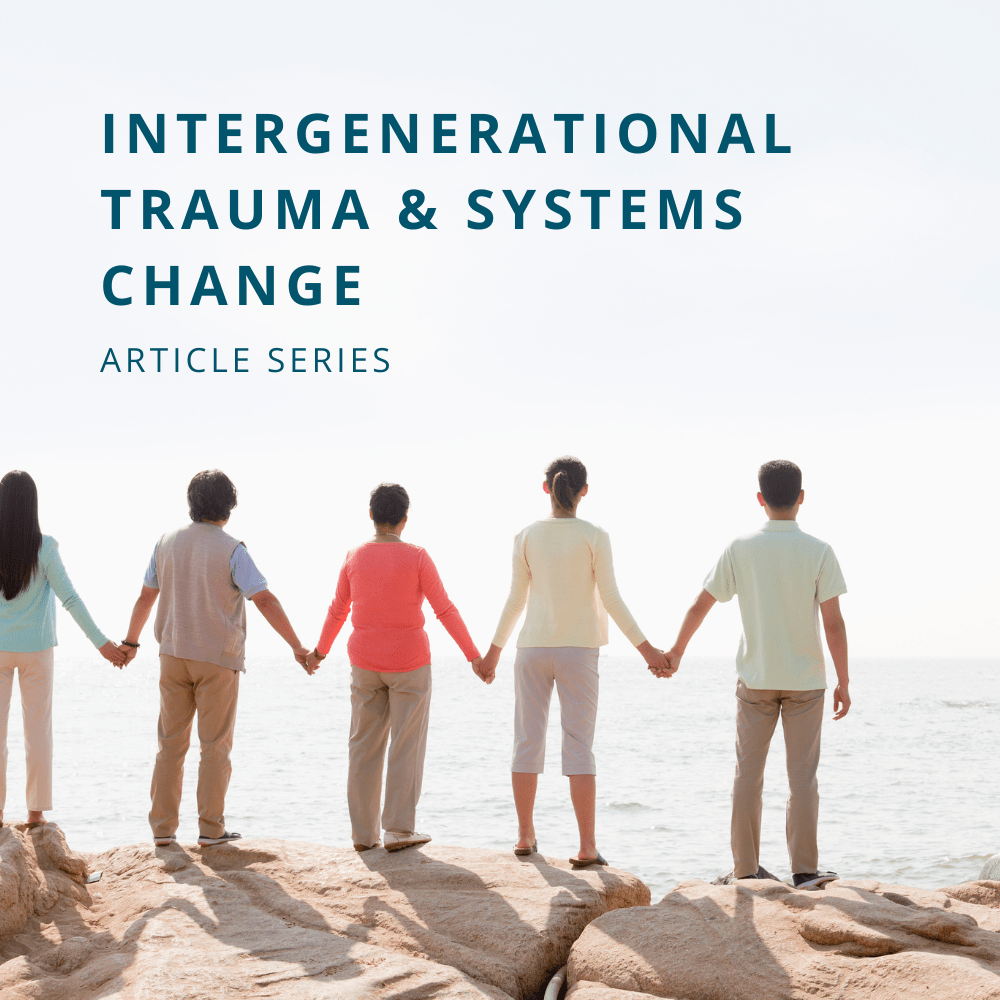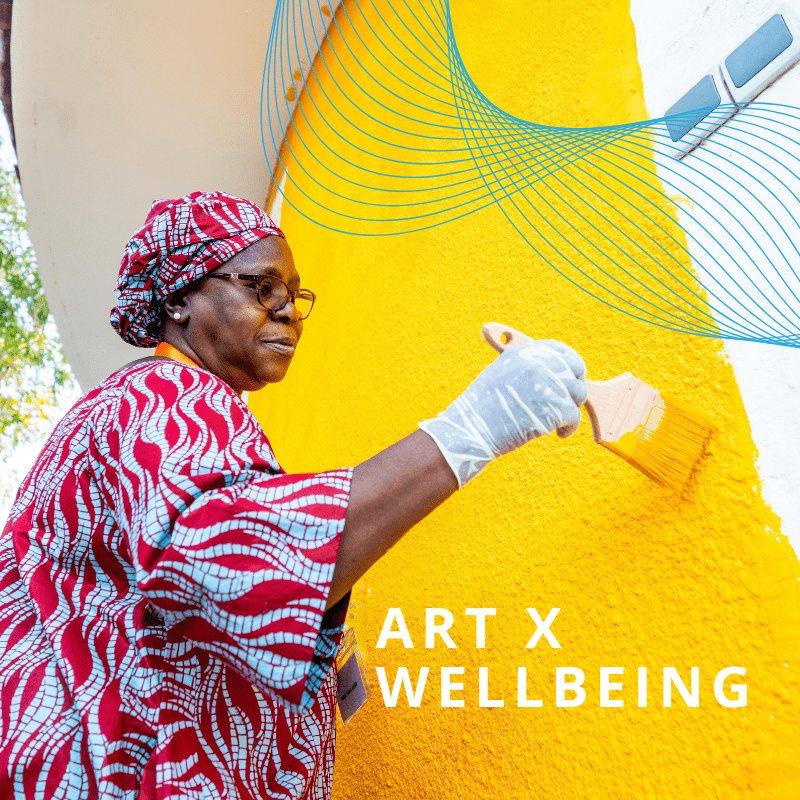
Interconnected Healing From Intergenerational Trauma Interconnected Healing From Intergenerational Trauma
Healing x Regional Hearth Summits
With a growing collective consciousness about the impacts of intergenerational trauma, the regional Hearth Summits are a space for changemakers to explore those impacts in the social change sector. In social change work, trauma can be found at the roots of the biggest challenges facing the world today—and in the lives of the people working to address them. Trauma-informed approaches to social change have the power to help unlock healing, wellbeing, and social transformation for all. The regional Hearth Summits offer an invitation for local communities of changemakers to explore this power, contributing to our global call to move from cycles of trauma to journeys of wellbeing.
Discover how the Hearth Summits’ deep conversations, moving art performances, and embodied workshops create a platform for us to encourage healing and wellbeing for everyone—everywhere.
COLLECTIVE HEALING FOR SYSTEMIC CHANGE COLLECTIVE HEALING FOR SYSTEMIC CHANGE
“It’s when we start working together that the real healing takes place.”
David Hume

Opening a Dialogue on Intergenerational Trauma
Research From the Being and Transforming Think Tank
In Brussels, The Wellbeing Project launched the first part of “Cycles of Trauma and Journeys of Wellbeing: A Framework for Trauma-Informed Practices and Positive Social Change” — the first co-creation from the Being and Transforming Think Tank’s 3-year exploration of intergenerational trauma and social change. The research was published on the Think Tank’s brand-new hub for research, stories, tools, and other resources about IGT and trauma-informed social change work. Changemakers are invited to explore the database of resources and add to it.
Intergenerational Trauma, Ancestry, and Race | Trauma Intergeracional, Ancestralidade e Raça
Session From Hearth Summit São Paulo
In São Paulo, Raquel Barros, Coordinator, Emotional Collaboration Laboratory (ENLACE) and the Possible Worlds Community Extension Program, FACENS University, and Isabel Santos Mayer, Coordinator, Brazilian Institute of Studies and Community Support (IBEAC), joined in a conversation on intergenerational trauma, ancestry, and race in Brazil. Watch the session (in Portuguese).
Katherine Milligan, Director of the Collective Change Lab, educated changemakers on the basics of trauma’s physiological effects on the body, including how the central nervous system initiates the fight-flight-freeze response, and leading changemakers in embodied practices.
Shawan Mahmud, daughter of intellectual martyr Altaf Mahmud, touched souls with her tale of healing from intergenerational trauma in the aftermath of the 1971 Bangladesh Liberation War, calling for accessible mental health services to support all who struggle with the ongoing impacts of the war.
Human rights activist and political refugee Marguerite Barankitse shared her inner and outer journey of peacebuilding after surviving ethnic cleansing campaigns in her home country of Burundi and starting an organization, Maison Shalom, to care for orphaned children.
Psychologist Edgar Gonzalez-Hernandez hosted a workshop on Compassion-Based Cognitive Therapy for participants in Bogotá in a session on how to recognize and start healing from trauma through an evidence-based approach.
Wellbeing Is Community, Resilience, and Inclusion
Interview With Okong’o Kinyanjui
In this interview at the first regional Hearth Summit in Nairobi, meet Okong’o Kinyanjui, Founder and Executive Director of the Queer African Network, as he shares how wellbeing inspires welldoing in his work to support the queer Pan-African community, whose wellbeing continues to be impacted by colonial-era penal codes across Africa.


Mapping the Impacts of Colonialism in Latin America
Workshop with Dr. Laura Calderon de la Barca
In Bogotá, psychotherapist Dr. Laura Calderon de la Barca, a specialist in collective trauma and senior associate of the Collective Change Lab, led changemakers in a reflection mapping the ongoing impacts of colonial history in Latin America and the Caribbean. Changemakers identified the parts of society where the trauma of colonialism is still visible as well as where they see opportunities to act for healing. As a group, they saw trauma manifesting the most within gender dynamics, and they saw the biggest window of opportunity for action in the arts.
You can learn more about Dr. de la Barca’s work to raise the collective consciousness around colonial trauma in the region in our recent webinar series with Collective Change Lab on creating healing systems for social change.
Addressing Post-Genocide Trauma in Rwanda
INTERVIEW WITH DR JEAN BOSCO NIYONZIMA
Director and Executive Founder of the Ubuntu Center for Peace, Dr. Jean Bosco Niyonzima, spoke at The Wellbeing Summit Dakar-Thiès about the impact of intergenerational trauma in Rwanda, where more than 50% of genocide survivors live with mental health disorders like depression. Listen to this brief interview with Voice of America to hear about his approach to mobilizing an integrated, scalable, cost-effective, community-based social healing model across Africa.
In Nairobi, co-chair Honorable Justice Martha K. Koome, EGH explored justice as a shared responsibility and lived experience, requiring empowered individuals, accessible courts, and support for the marginalized. Critical issues discussed included addressing the overrepresentation of people with disabilities in prisons, reducing stigma, and decolonizing the justice system to promote restorative justice.
In Senegal, Safe Open Spaces (SOS) hosted small group sessions to promote emotional expression, active listening, and empathy among changemakers. Focusing on youth mental health, the SOS workshop offered practical skills to young changemakers to use for healing and personal growth.
The intergenerational wellbeing panel in Nairobi, chaired and moderated by Edwin Macharia, explored how individuals, families, and communities are interconnected and shape our collective ecosystem. The session explored how traditional methods can address community trauma and bridge generational gaps by preserving cultural knowledge and fostering overall wellbeing.
Healing From Trauma: The Leadership Skill You Didn’t Know You Needed
INTERVIEW WITH BENOIT LEGRAND
Leaders face challenges every day when managing teams and making decisions. But visionary business leader-turned-psychogenealogist Benoît Legrand says the biggest challenge can actually be an internal one. Hear from Benoît, who spoke about the impacts of intergenerational trauma in leadership and organizational wellbeing at The Wellbeing Summit Brussels, reflect on why leaders should prioritize their wellbeing and healing to be a positive presence for themselves, their teams, and their organizations.
PROCESSING TRAUMA AND HEALING THROUGH THE ARTSPROCESSING TRAUMA AND HEALING THROUGH THE ARTS
“At the deepest level, the creative process and the healing process arise from a single source.
When you are an artist, you are a healer.”
Rachel Naomi Remen
“Tears Ain’t Nothing But Liquid Prayers”
Poetry by Hannah L. Drake
Author, poet, and activist Hannah L. Drake stirred the emotions of her audience at The Wellbeing Summit Omega Institute-Harlem Wellness Center with her poem “Home,” a rebuttal to the state song of Kentucky (where she is from), “My Old Kentucky Home.”
Brilliante Aurora
Music by Oro y Platino
The alabaos are traditional Afro-Colombian funeral songs used to express and share grief and mourning that have been passed down generation to generation. Enjoy this song performed by Oro Y Platino, a group from the Condoto Chocó region of Colombia, who also took to the stage at The Wellbeing Summit Bogotá. All alabaos songs help people to say goodbye to their beloved. “Brillante Aurora” is about saying goodbye to a mother — with the song lyrics, they say goodbye to the Virgin Mary.
The Healing Power of MusicThe Healing Power of Music
MUSIC BY ASIF IQBAL AONTU
At The Wellbeing Summit Dhaka, we discovered musician and journalist Asif Iqbal Aontu’s extraordinary journey from imprisonment to musical soul healing. Through his music, he shares how his toughest experiences led him to a new direction, blending music with cosmic thoughts. With each song, he skillfully intertwines life’s tragedies, pains, and afflictions into a harmonious tapestry.
EXPLORE HEALING AND WELLBEING FURTHER EXPLORE HEALING AND WELLBEING FURTHER
Dive Into Research, News, and Stories on Intergenerational Trauma

Global Expressions Of The Arts, The Universal Language of Wellbeing Global Expressions Of The Arts, The Universal Language of Wellbeing
Arts x Regional Hearth Summits
As a universal language for human connection, emotion, and experiences, the arts are at the heart of the regional Hearth Summits. They celebrate the diversity of our global network by welcoming local artists, dancers, musicians, performers, and other creatives to encourage us to experience and reflect on wellbeing in unique ways. At these gatherings, the arts invite us to immerse ourselves in the sights and sounds of global cultures while exploring key topics in the wellbeing for social change space.
Discover a mosaic of perspectives on wellbeing through this rich tapestry of artistic expression at these incredible gatherings.
Music & SongMusic & Song
“Where words fail, music speaks.”
Hans Christian Andersen
Colombian singer Fonseca brought a larger-than-life concert to the Wellbeing Summit in his hometown of Bogotá.
Dak’Harmony, a group of music enthusiasts from Dakar, brought upbeat African music and covers of classic songs to the closing celebration of The Wellbeing Summit Dakar-Thiès
Roll The Voice, a collective of multidisciplinary musicians with diverse abilities in Bogotá, invited audiences to explore their perspectives on disabilities through their energizing hip-hop performances.
Oro y Platino, a group from the Condoto Chocó region of Colombia, shared soulful renditions of alabaos, traditional Afro-Colombian songs of mourning and healing.
Wellbeing of the World, a collaborative project from Tod Machover and the MIT Media Lab, unites the Summits by inviting participants to co-create a symphony of global wellbeing sounds.
French-Israeli singer Yael Naim shared her experience healing with the arts and treated The Wellbeing Summit Brussels to an intimate performance of her soulful music.
Black Keme (Antoine Indega Boubane) embodied the fusion of tradition and modernity in African music by weaving in his cultural Bassari heritage in his performances.
Harpist Alix Collin rang in each new session at The Wellbeing Summit Brussels with the powerful, vibrating sound of the gong.
Bangladeshi mental health activist and musician Farzana Wahid Shayan gifted moving performances of songs dedicated to the themes of forgiveness and self-empowerment.
Local youth performed dances mixing traditional Bangla moves with modern sounds, all set against the musical backdrop of songs that inspired the freedom fighters in Bangladesh’s 1971 independence war.
Tuntun Shah Baul offered the soul-stirring melodies of traditional Baul music, which embodies the inner pursuit of peace preached by the Bengal mystic, Lalon.
Sister Fa (Fatou Diatta), a Senegalese rapper and activist, reflected on her wellbeing journey and social change in Africa with an invigorating hip-hop performance.
Music Creatives for Change
Session at Hearth Summit Athens
In Athens, a co-created agenda with arts group Act in Synch invited changemakers to reflect on social change through an artistic lens. In the music industry, different musicians, producers, organizers, and non-profits have been taking a step outside their bubble to drive change in both environmental and social justice arenas. Hear from four different examples from EarthPercent, EarthSonic, In Place of War, and Music Declares Emergency. Watch the session (in English).
THEATRE THEATRE
“I regard the theatre as the greatest of all art forms, the most immediate way in which a human being can share with another the sense of what it is to be a human being.”
Thorton Wilder

“TOM MBOYA”
BY TOO EARLY FOR BIRDS
In Nairobi, changemakers were captivated by stories from Too Early for Birds, a Kenyan theatre show that retells, presents, and narrates the most scintillating parts of Kenyan history that school books failed to mention. The group shared the story of Tom Mboya, one of the country’s most illustrious luminaries, in honour of the 55th anniversary of his death. Through an enchanting, engaging mix of theatrics, they reflected on the life of a man who inspired a new generation of young, brilliant, energized Africans driven to make the best out of freshly independent African nations — and in whose footsteps Kenyan Gen-Z are walking in 2024.

“MONDIAL.E.S”
BY BRRR PRODUCTION
At The Wellbeing Summit Dakar-Thiès, Brrr Production, a Dakar-based theatre company exploring political and social issues, performed MONDIAL.E.S. This piece explores the role of women in Senegal and the wider world through the story of Salimata and Fatoumata, who decide to set up an association to promote gender equality. By questioning our stereotypes of men and women, the show took a humorous, ironic look at the possibilities of fighting for a fairer world.
CO-CREATIONS CO-CREATIONS
“Individually, we are one drop. Together, we are an ocean.”
Ryūnosuke Satoro
Dabakh (Serigne Abdou Aziz Ndiaye) a young Senegalese graffiti artist and painter, immortalized The Wellbeing Summit Dakar-Thiès by leading participants in co-creating a “wellbeing mural” at Tostan’s Training Centre.
Participants were encouraged to paint together throughout The Wellbeing Summit Bogotá to enjoy the flow of creativity, together, under the guidance of local creator Carlos Eduardo Meneses.
During Omega Institute and the Harlem Wellness Center’s musical performances, cartoonist Liza Donnelly captured the essence of the music with live illustrations.
EXHIBITIONS & ART INSTALLATIONS EXHIBITIONS & ART INSTALLATIONS
“Art is not what you see, but what you make others see.”
Edgar Degas
TheMerode’s curated art exhibition, Shōkakkō, explored happiness in all its forms through works created by 54 artists from around the world placed throughout The Wellbeing Summit Brussels.
In collaboration with the 12th edition of Partcours, Tostan curated a special exhibit about wellbeing with Senegalese artists Fatim Soumaré and Omar Diouf (Yafane) called “Yoonu ci biir (The Inner Pathway)”.
The Omega Institute and Harlem Wellness Center worked with the Rubin Museum to bring the Mandala Lab to a regional Wellbeing Summit, inviting participants to explore their emotions.
At Tostan’s Training Centre, participants contemplated the “Art for Mental Health” exhibition, featuring creations from clients of the Moussa Diap psychiatric clinic’s groundbreaking art therapy programme.
In Dhaka, award-winning photographer Shafiqul Alam Kiron shared images from his 20+ year career documenting acid violence in Bangladesh. The photographs offer an intimate look at acid violence survivors’ experiences in their long journey to recovery, both physically, mentally, and socially.
Reigniting Rituals Through the Arts, the Universal Language of Wellbeing
In an exciting collaboration with Community Arts Network (CAN), we are excited to launch a global initiative around the arts to create a unique and magical vision, along with local communities, around the concept of Ecological Belonging. Seven passionate and dynamic individuals (one for the regional Hearth Summits in Austria, Brazil, Colombia, India, Japan, Senegal, and the US) have taken on the role of Ritual Alchemist. Through the arts, they will delve into a local ritual or practice and engage the community in a journey to renew it for today.
Applications are now closed. Stay tuned to meet the Ritual Alchemists and follow their artistic journey to the Hearth!
EXPLORE ART AND WELLBEING FURTHER EXPLORE ART AND WELLBEING FURTHER
Dive Into Art Stories From Around the World
Global Summit on Dance Movement Therapy for Change – Reflections Global Summit on Dance Movement Therapy for Change – Reflections

By: Anubha Agarwal , Research & Learning Manager at The Wellbeing Project
Date: January 2023
Last month I had the pleasure to represent The Wellbeing Project at the Fourth Biennial Global Summit on Dance Movement Therapy for Change in the eclectic and colorful city of Jaipur, Rajasthan in India.
The two-day event was co-hosted by Kolkata Sanved – a non-profit organization based in India promoting holistic well-being through Dance Movement Therapy (DMT) and Center for Lifelong Learning (CLL), Tata Institute of Social Sciences – a unit of the leading public research university in India.
The fourth biennale held on January 12-13th , 2023 in Jaipur was focused on exploring the role of DMT and other creative expressions in building our collective resilience for navigating a world that seems to be at a heightened risk of diminished ecological health and well-being. The 2023 Fourth Biennale DMT for Change was attended by a diverse global audience comprising of development sector professionals, including DMT practitioners, Creative Art Therapy (CAT) practitioners, social scientists and public health experts.
With a colorful mix of experiential sessions, workshops, panel discussions and art installations, the Summit events wove together seamlessly in a rich tapestry. While ecological well-being of planet Earth and the looming danger of the climate crisis was the dominant theme at the Summit, the event was peppered with participatory sessions and workshops employing music, visual arts and storytelling to express individual reflections.
That artistic underlying theme at the Summit was evident, when at the time of registration, each Summit attendee was offered an option to choose a handheld musical instrument ( displayed below ). I found it amusing to briefly fiddle with the wide range of percussion instruments and select one, even though the intended use was not entirely clear to me. It became clear in time as the attendees enthusiastically sounded the percussion tools to endorse a speaker or an idea, infusing fresh energy and cheerfulness into the Summit events in the process.
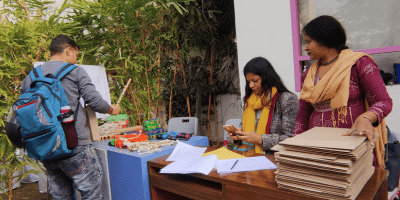
Before the Summit, I was unfamiliar with the role of dance movement therapy as a psycho-therapeutic healing practice. Even though it is commonly known that dancing releases mood-enhancing hormones in humans, I was curious to understand how DMT was different in terms of providing subsistence to trauma victims and survivors of violence in our communities.
While I was quite thrilled to avail an opportunity to experience DMT through an experiential workshop at the Summit, I was also mindful not to participate in the workshop with the possibly unfair expectation to fully imbibe the therapeutic benefits of dance movement therapy. Considering DMT is a therapy, it might need longer duration support and intervention, than joining in one hour and a half long session. Having personally experienced the de-stressing effect of many dance forms in the past despite having two left feet, I was looking forward to experiencing DMT first hand.
During the workshop, free flowing movements that came naturally to each one of us were encouraged, the underlying thought being that DMT is a safe space where in every individual is free to express themselves in the way they want. In line with this tenet, an unfamiliar yet intriguing section of the workshop encouraged each participant to imagine their physical body as a paint brush and to use their limbs and torso to paint a limitless, imaginary canvas. Shifting my mental lens to think of my physical form as a paint-brush took some getting used to but eventually the infectious energy of the workshop cohort took over.
I admit to feeling mentally relaxed and exhilarated post-workshop but still curious to understand how DMT could potentially serve as an antidote to counteract violence in our vulnerable communities. In a country like India, society norms can be quite restrictive of womens’ movement outside the society- or family-ordained ‘safe’ physical spaces, so I felt it would have been insightful to know how the DMT practice can support individuals in freely expressing their possibly repressed agency and take better care of their holistic well-being. In retrospect, I think hearing narratives from DMT practitioners who use DMT as a tool to navigate everyday threats to their physical and mental well-being, would have been of immense value in understanding the practice better.
It is entirely possible that such narratives may have already been shared in the past Summit editions, but as a first-time participant, I missed the absence of such narratives. I did get to interact with a couple of DMT practitioners who mentioned that the practice helps them cope with everyday stress and shift the lens on how they view their lives.
[mk_padding_divider size=”20″]

One of the key learnings for me during the Summit was the reinforcement that approaches to enhance one’s well-being are quite individualized. Availing the opportunities to experience different expressive art forms at the Summit was a constant reminder that there is no one-size-fits-all approach to well-being. An art therapy that might have a profound impact on one, might fail to put a dent on another individual’s well-being.
There is also the question of lack of funding to support well-being – the proverbial elephant in the room. However, until the world decided to acknowledge the presence of the aforementioned elephant and fully awaken to the mental health crisis we are in, one of the speakers at the Summit offered a slightly simpler solution to cope, “Art therapy is expensive… a good place to start is to start noticing what art tools you have easy access to at home such as fallen leaves, spices or other readily accessible elements of nature often overlooked. Art material could be taken from elements that are part of an individual’s environment or identity.”
The two-day DMT Summit for Change feels like a great step in the right direction as such gatherings help mainstream conversations on mental well-being and facilitate the oft-forgotten human connect. Overall, the two days left me feeling happier, joyous and craving for more opportunities to rekindle the deeper human connect, that often gets overlooked in our everyday lives, but that such events help us remember.
The reigning emotion for me at the end of the two-day art-based DMT for Change Summit and 2022 The Wellbeing Summit was that of HOPE. Hope for mental well-being taking center stage at a global level, specifically in cultures that in the aftermath of the pandemic are slowly opening up to talking about mental health and well-being.

Aakash Odedra
Dancer and Choreographer
Aakash Odedra was born in Birmingham, UK and lives in Leicester. He is a globally recognised and award-winning dancer and choreographer. He trained in bharatanatyam and kathak, then moved to India as a student of the renowned Bollywood choreographer Shiamak Davar. Aakash Odedra’s work forms the heart of the company and as a soloist he has performed over 300 full length performances in 40 countries in the past decade. His choreography pushes boundaries, responding to and drawing inspiration from contemporary issues. As a British-Asian, Aakash Odedra uses his voice to translate ancient and contemporary movement languages to tell new stories
Awards include the Amnesty International Award for Freedom of Expression; Best Dance at the Eastern Eye ACTA Awards 2018; a nomination for Best Stage Production at the 2019 Asian Media Awards for #JeSuis; and in 2021, Aakash was a awarded a British Empire Medal in the Queen’s New Year’s Honours for his services to dance. Notable commissions include James Brown: Get on the Good Foot (Apollo Theater, NY). In 2017 Aakash choreographed the Royal Opera House production Sukanya composed by the late great Pt Ravi Shankar and was movement director for Curve Theatre’s Pink Sari Revolution.
As a solo performer his awards include: Danza&Danza award (Italy); Dora performance award (Canada); Audience Award Dance Week (Croatia); Infant Award (Serbia); Bessie Award New York (Best Male Performer); and a Sky Academy Arts Scholarship.
Connect with Aakash Odedra on social media :




